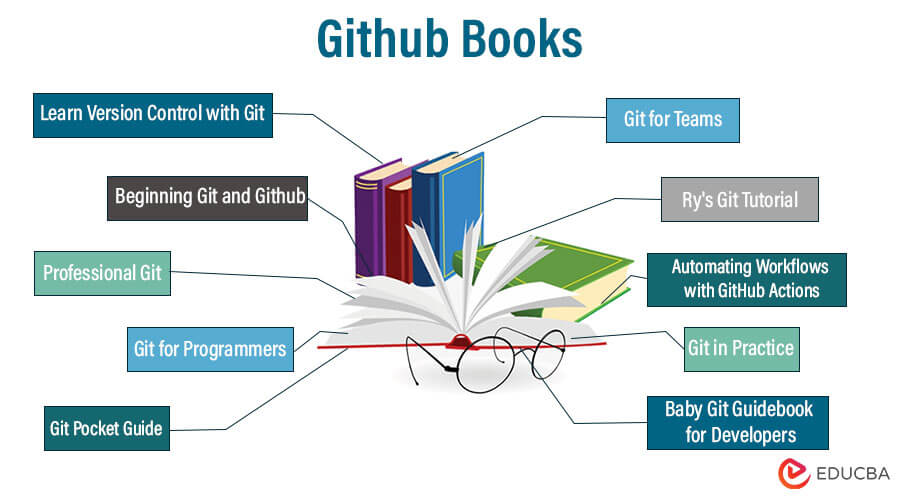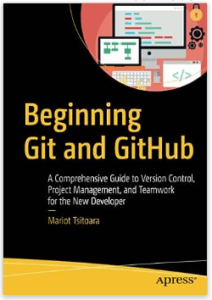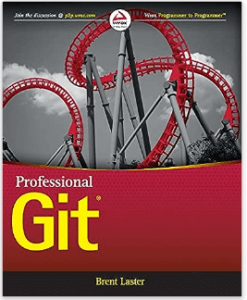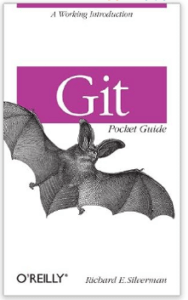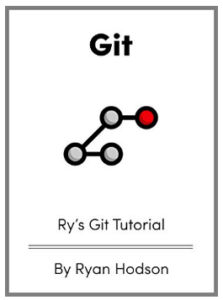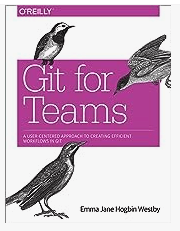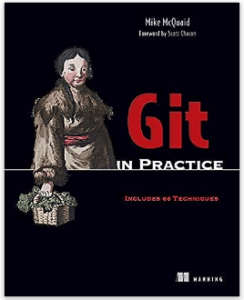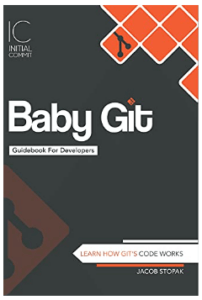Top GitHub Learning Books
The GitHub Books is a curated selection of authoritative works, each penned by experts who possess an intimate understanding of version control’s nuances, the GitHub ecosystem’s intricacies, and the art of seamless collaboration. From novices taking their first steps into version control’s realm to experienced developers aiming to optimize their workflows, this collection caters to a diverse audience eager to harness the potential of GitHub to its fullest extent.
Get ready to begin a transformation journey as you explore the collection of books available on GitHub. Regardless of your starting point, these books illuminate your path, equip you with invaluable insights, and guide you toward mastering the art of version control and effective collaboration in the GitHub era. Your journey into the heart of software development begins here.
Key Features
- GitHub books cover the frequently accessed topics revolving around pulling, committing, and accessing the git original command tutorial.
- It improvises on the already built content on trees and modules on git.
- Specifies the working web flows, distributed workflows, and related terminologies to upskill the reader’s knowledge.
List of 10 Best GitHub Books
| Sr No | Books | Author | Published | Rating |
| 1. | Learn Version Control with Git: A step-by-step course for the complete beginner | Tobias Günther | 2017 | Amazon: 4.3 Goodreads: 4.2 |
| 2. | Beginning Git and Github: A Comprehensive Guide to Version Control, Project Management, and Teamwork for the New Developer | Mariot Tsitoara | 2019 | Amazon:4.2 Goodreads:4.1 |
| 3. | Professional Git | Brent Laster | 2016 | Amazon: 4.4 Goodreads:4.1 |
| 4. | Git for Programmers: Master Git for effective implementation of version control for your programming projects | Jesse Liberty, Jon Galloway | 2008 | Amazon:3.4 Goodreads: 2.7 |
| 5. | Git Pocket Guide: A Working Introduction | Richard Silverman | 2013 | Amazon:4.5 Goodreads: 3.9 |
| 6. | Ry’s Git Tutorial | Ryan Hodson | 2014 | Amazon: 4.6 Goodreads: 4.3 |
| 7. | Git for Teams: A User-Centered Approach to Creating Efficient Workflows in Git | Emma Hogbin Westby |
2015 |
Amazon 4.4 Goodreads- 3.5 |
| 8. | Automating Workflows with GitHub Actions: Automate software development workflows and seamlessly deploy your applications using GitHub Actions | Priscila Heller | 2021 | Amazon 4.3 Goodreads -2.5 |
| 9. | Git in Practice: Includes 66 Techniques | Mike McQuaid | 2014 | Amazon 4.1 Goodreads- 4.04 |
| 10. | Baby Git Guidebook for Developers: Learn How Git is Coded | Jacob Stopak | 2015 | Amazon: 4.0 Goodreads: 4.2 |
Let’s review and discuss the best GitHub books.
Book#1: Learn Version Control With Git
Author: Tobias Günther
Get this Book link
Book Review
The sleek design of the book, paired with the invaluable knowledge inside, is bound to give the majority population reason enough to go out of pocket. The author leads the reader step-by-step to their destined goal,i.e., getting to know about version control the best way.
Key Takeaways
- This book can give you reference material and extensive knowledge to get your next git project up and running in no time using CLI or TOWER GUI.
- It doesn’t go into the intricacies of too much detail that the reader might often not require rather it sticks to what is important.
Book#2: Beginning Git And GitHub
Author: Mariot Tsitoara
Get this Book link
Book Review
Have a knack for pulling all-nighters for codebugs that won’t let you move on? Then this book is just for you. Written eloquently, that will gently ease you into the complexities broken down into multiple steps to make it time efficient. Learn practical advice, concise examples, and profound explanations from the subject matter expert herself.
Key Takeaways
- Get a jot down experience about version control, project management, and teamwork.
- Apply concepts to real-world scenarios to protect yourself against pitfalls and loopholes hindering your workspace growth.
Book#3: Professional Git
Author: Brent Laster
Get this Book link
Book Review
Brent Laster starts by establishing a solid foundation, explaining the basic Git model, its components, and how they work together. This book is the means to clear all your doubts and roadblocks regarding Github. Each exercise is a building block for the later one and helps with retention and practice.
Key Takeaways
- Get above and beyond using the basic git model and overall workflow.
- Further, your learnings in Git promotion Model, tracking using file status life cycle and functionality of trees and modules in git.
Book#4: Git for Programmers
Author: Jesse Liberty, Jon Galloway
Get this Book link
Book Review
Tighten your shoelaces as you are ready for the next book that will leave your jaw open-mouthed for all the geeky GitHub knowledge it has. It introduces the topics of easily migrated platforms and how to optimize Github practices on each.
Key Takeaways
- Get a good command over a vast ocean of git commands and an even greater set of options within them.
- The highlights of this book are bisecting and committing and fixing mistakes that are thoroughly explained.
- An overview of merging, pulling requests, and rebasing is provided in great depth.
Book#5: Git Pocket Guide
Author: Richard Silverman
Get this Book link
Book Review
A quick byte-sized book but with years’ worth of knowledge that is sure to make you shell-shocked with wonder as you finally connect the dots as to how the naming convention of git workflows has come up. This a great guide on practicing it and being aware of what leads to what goes down the rabbit hole.
Key Takeaways
- Contains the state of your project checkpoints, the basics of building a repository, and the technical know-how associated with it.
- Clone the repository and get formulas for accessing remote repositories.
- Despite its byte-sized format, the book’s content is insightful and enriching. It provides practical insights that can be readily applied to real-world Git usage.
Book#6: Ry’s Git Tutorial
Author: Ryan Hodson
Get this Book link
Book Review
Ry’s git tutorial lays down the complexities of GitHub in layman’s terms and goes over existing code to refactor it into something brilliant. Have your way with creating commits, reverting snapshots, and tackling core Git concepts firsthand.
Key Takeaways
- Covers centralized workflows, distributed workflows, and tips and tricks for efficient methodologies.
- It implements practical use cases that can be learned to build HTML and CSS skeletons
Book#7: Git For Teams
Author: Emma Hogbin Westby
Get this Book link
Book Review
Titled as the best book for experienced developers, it helps them with both project management and provides essential tools for upgrading their git command knowledge. Implement strategies that prove useful for the entire team and boost good working morale through this book.
Key Takeaways
- Deploy and curate workflows to influence and expect good code reviews.
- The conversational tone is a bonus while reading topics like command and control and branching strategies.
Book#8: Automating Workflows With GitHub Actions
Author: Priscila Heller
Get this Book link
Book Review
Know about the latest tech through this book and incorporate up-and-coming tech stacks such as CI/CD, and DevOps with Git Hub. Practice the method of building live-running GitHub applications with the use of these tech stacks and push them into the market.
Key Takeaways
- Get a hang of a closer look at workflows and self-hosted runners.
- Be equipped with the future of GitHub actions, migrations, and publishing your actions.
Book#9: Git In Practice
Author: Mike McQuaid
Get this Book link
Book Review
Have a breakthrough journey with the help of the most searched and most sought after- 66 techniques that sure can change your outlook on git. Get to know easy-to-follow discussion formats and implement good interaction strategies.
Key Takeaways
- Find useful information on remote git, personalizing git, and pull requests.
- Work with the subversion, vendor dependencies, recommended team workflows, etc. concisely.
Book#10: Baby Git
Author: Jacob Stopak
Get this Book link
Book Review
The book dives deep into the first software version of Git, which was created in 2005. Despite its old nature, the book serves its purpose as the language developers can turn to in times of need.
Key Takeaways
- Lays the foundation for installing git’s original version, accessing git’s original command tutorial, and many more such things.
- Create trees with write-tree. c,cat-file.c, calculate diffs with show-diff, etc.
Recommended Articles
We hope that this EDUCBA information on “GitHub books” was beneficial to you. You can view EDUCBA’s recommended articles for more information.
